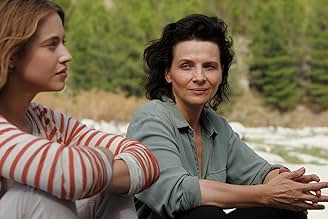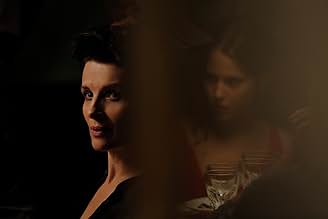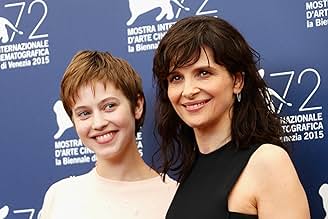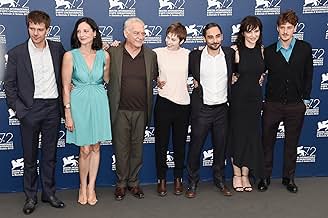NOTE IMDb
6,5/10
2,7 k
MA NOTE
Une mère rencontre de manière inattendue la fiancée de son fils dans une villa en Sicile et apprend à la connaître en attendant l'arrivée de son fils.Une mère rencontre de manière inattendue la fiancée de son fils dans une villa en Sicile et apprend à la connaître en attendant l'arrivée de son fils.Une mère rencontre de manière inattendue la fiancée de son fils dans une villa en Sicile et apprend à la connaître en attendant l'arrivée de son fils.
- Réalisation
- Scénario
- Casting principal
- Récompenses
- 7 victoires et 9 nominations au total
Avis à la une
"L'Attesa" (2015 release from Italy; 99 min.; English title: "The Wait") brings the story of two women. As the movie opens, we see Anna (played by Juliette Binoche) at a church service, it looks like a funeral. Not long thereafter, Anna gets a phone call, during which she mentions "He's not here, I'm his mother, but come on over". Shortly thereafter, a young lady named Jeanne arrives at the estate (in Sicily, we later learn). She is the girlfriend of Anna's son Giuseppe. Anna tells her that Giuseppe will be back later in the week, in time for Easter. Where is Giuseppe? Why won't he take Jeanne's calls? What is really going on here? To tell you more would spoil your viewing experience, you'll just have to see for yourself how it all plays out.
Couple of comments: this is the feature debut of Italian writer-director Piero Messina, who previously was assistant-director in the Oscar-winning "The Great Beauty". Here, he builds a mystery as to why Giuseppe is absent, when he might return (or not) and what really happened to him. We are left guessing from start to finish, while we see the great Juliette Binoche deliver another towering performance as she grieves (whose funeral was that anyway? do we really believe it when Anna tells Jeanne "My brother died"?), Up-and-coming French actress Lou de Laâge as Jeanne is equally outstanding, a new talent we surely have not seen the last of. As mentioned, the movie is set in Sicily, which I typically do not associate with lakes and water, both of which are prominent in the film. Last but certainly not least, there is a ton of great music in the movie, both the original score (which director Messina co-composed I might add) and songs placements. There is a note-worthy scene in the movie which plays out as Leonard Cohen's "Waiting for the Miracle" is blaring, and the XX's "Missing" plays over the movie's end credits. There couldn't have been a more appropriate song to close out the movie.
"L'Attesa" opened this weekend at my local art-house theater here in Cincinnati and I couldn't wait to see it. The Friday early evening screening where I saw this at turned out to be a private screening: I was literally the only person in the theater, to my surprise. That said, it is clear that this movie is going to struggle to find a large audience: it is slow-moving, with no clear resolutions, and "all talk, no action". These are not criticisms as far as I'm concerned, au contraire, I found myself mesmerized by the way the movie unfolded, and this flew by in no time. If you are in the mood for a somber but top-notch foreign film dealing with grief, absence, and longing, I'd encourage you to check this out, be it in the theater, on VOD or eventually on DVD/Blu-ray. "L'Attesa" is HIGHLY RECOMMENDED!
Couple of comments: this is the feature debut of Italian writer-director Piero Messina, who previously was assistant-director in the Oscar-winning "The Great Beauty". Here, he builds a mystery as to why Giuseppe is absent, when he might return (or not) and what really happened to him. We are left guessing from start to finish, while we see the great Juliette Binoche deliver another towering performance as she grieves (whose funeral was that anyway? do we really believe it when Anna tells Jeanne "My brother died"?), Up-and-coming French actress Lou de Laâge as Jeanne is equally outstanding, a new talent we surely have not seen the last of. As mentioned, the movie is set in Sicily, which I typically do not associate with lakes and water, both of which are prominent in the film. Last but certainly not least, there is a ton of great music in the movie, both the original score (which director Messina co-composed I might add) and songs placements. There is a note-worthy scene in the movie which plays out as Leonard Cohen's "Waiting for the Miracle" is blaring, and the XX's "Missing" plays over the movie's end credits. There couldn't have been a more appropriate song to close out the movie.
"L'Attesa" opened this weekend at my local art-house theater here in Cincinnati and I couldn't wait to see it. The Friday early evening screening where I saw this at turned out to be a private screening: I was literally the only person in the theater, to my surprise. That said, it is clear that this movie is going to struggle to find a large audience: it is slow-moving, with no clear resolutions, and "all talk, no action". These are not criticisms as far as I'm concerned, au contraire, I found myself mesmerized by the way the movie unfolded, and this flew by in no time. If you are in the mood for a somber but top-notch foreign film dealing with grief, absence, and longing, I'd encourage you to check this out, be it in the theater, on VOD or eventually on DVD/Blu-ray. "L'Attesa" is HIGHLY RECOMMENDED!
Too slow, borderline unwatchable. It's 100 minutes but it felt at least 150. It should have been at least 20 minutes shorter. The worst thing is that it plays like a mystery, and there are no mysteries here, even though director tries hard to make it a bit enigmatic and cryptic. If it was a "pure" drama movie, without the "mystery" element, it could have been a good, even great. Because there are positives here, it's well acted and well directed. Juliette Binoche is so charismatic that she almost turns this boredom into an interesting movie. Furthermore, cinematography is nice and overall, movie's technical aspects are above average.
Yet, it's a failure. This could have been good because Binoche's motives for doing what she did, are crystal clear to me. I understood what she's going through and why she behaves like this. But still, the mystery element is unnecessary.
Ending was great.
Yet, it's a failure. This could have been good because Binoche's motives for doing what she did, are crystal clear to me. I understood what she's going through and why she behaves like this. But still, the mystery element is unnecessary.
Ending was great.
Without any planning, in the last few days I saw 2 films starring Lou de Laâge and although with completely different characters in both films (L'attesa and Respire) I was pleased with her capacity to enter the role . Juliette Binoche is as always one of the best actresses of her generation and always make great performances. About this L'attesa I can say that although in some parts the film goes a bit too long in the suspense, the story is well written and better represented by the cast. The image plans are very good but sometimes too still. But it is a must see film. A very good work from Francesco Di Giacomo However the story is never totality told to the audience, letting one always thinking ahead.
"The Wait" ("L'Attesa") is a film that has really nice acting but the story itself didn't do much for me. Its vague ending left me cold and the behaviors of the leading lady, Anna (Juliet Binoche) just didn't make a lot of sense--regardless of what REALLY happened at the end.
When the film begins, Jeanne (Lou de Laâge) arrives at a Sicilian villa and instead of being greeted, she's given a meal by a servant and then retires to bed without seeing the woman of the house, Anna. The next day, Jeanne comes downstairs and finds that there's been some sort of funeral...and Jeanne tells her it's because her brother died...though it's pretty obvious that this might NOT be the truth. Jeanne has come to see Anna's son and spend her vacation with him....but through the course of the film, the son never arrives and Jeanne is feeling abandoned...though Anna and her seem to have a few moments together bonding.
Where does all this go? Well, as I mentioned above, the ending is a bit vague and it's easy to see two very different interpretations. I didn't really care about either one because Anna's actions simply didn't make much sense....and because of that the film lost me. Well acted, this film needed some better writing as the characters didn't always seem realistic or believable.
When the film begins, Jeanne (Lou de Laâge) arrives at a Sicilian villa and instead of being greeted, she's given a meal by a servant and then retires to bed without seeing the woman of the house, Anna. The next day, Jeanne comes downstairs and finds that there's been some sort of funeral...and Jeanne tells her it's because her brother died...though it's pretty obvious that this might NOT be the truth. Jeanne has come to see Anna's son and spend her vacation with him....but through the course of the film, the son never arrives and Jeanne is feeling abandoned...though Anna and her seem to have a few moments together bonding.
Where does all this go? Well, as I mentioned above, the ending is a bit vague and it's easy to see two very different interpretations. I didn't really care about either one because Anna's actions simply didn't make much sense....and because of that the film lost me. Well acted, this film needed some better writing as the characters didn't always seem realistic or believable.
This is a haunting movie, but I think it could have used a tad more plot. Even Binoche's genius for ambiguous facial expressions strains to paper over deficiencies in the story.
I was intrigued to see that it was based on a Pirandello play, but "based" is too strong - it's at best inspired by "La vita che ti diedi", and from what I can tell (I'm not fluent in Italian) the movie omits most of the play's boldest psychological points.
I was intrigued to see that it was based on a Pirandello play, but "based" is too strong - it's at best inspired by "La vita che ti diedi", and from what I can tell (I'm not fluent in Italian) the movie omits most of the play's boldest psychological points.
Le saviez-vous
- Anecdotes"L'attesa" is a period of time whose duration is unknown and therefore it symbolizes a real act of faith. In this case, this act for Anna and Jeanne consists in waiting for the return of Giuseppe, the son of Anna and Jeanne's boyfriend, with the difference that the first knows the truth, while the second lives in the mystery. The return of Giuseppe takes on the meaning of a miracle. The song "Waiting for the miracle" emphasizes this detail.
- GaffesAbout one half hour into the movie Binoche cracks an egg into a frying pan, thereby breaking the yolk. However, when she serves it to her son's girlfriend the yolk is whole.
- Citations
Anna Remigi: Jealousy means that there is still desire.
- ConnexionsFeatures Arrangiatevi (1959)
- Bandes originalesOrchestral Loop
Music by Ben Lukas Boysen
Published by Erased Tapes Music
Meilleurs choix
Connectez-vous pour évaluer et suivre la liste de favoris afin de recevoir des recommandations personnalisées
- How long is L'attesa?Alimenté par Alexa
Détails
Box-office
- Budget
- 3 200 850 € (estimé)
- Montant brut aux États-Unis et au Canada
- 55 804 $US
- Week-end de sortie aux États-Unis et au Canada
- 5 686 $US
- 1 mai 2016
- Montant brut mondial
- 1 010 766 $US
- Durée
- 1h 40min(100 min)
- Couleur
- Rapport de forme
- 2.35 : 1
Contribuer à cette page
Suggérer une modification ou ajouter du contenu manquant

















